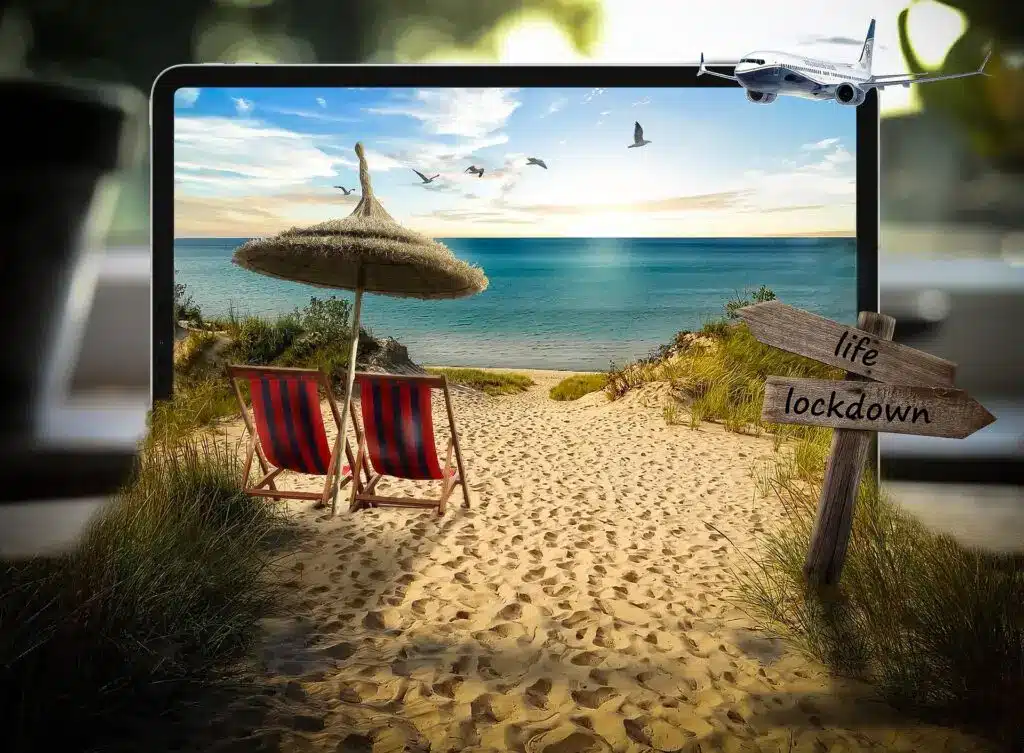
Pontoon boating safety measures are always essential every single time you push off the dock. But for social distancing and safe pontoon boating in the COVID-19 pandemic, there are a number of additional measures to take in order to ensure that safe social distancing is practised throughout the whole activity.
Guidelines for Safe Pontoon Boating in the COVID-19 Pandemic
Strict limit to the people aboard your pontoon boat
You’ll need to strictly limit the number of people aboard the boat, and only to those family you share a home with, or members of your quarantine pod.
The CDC advises against gatherings of more than 10 people. But if there’s just four or so members in your household, still try and avoid having guests altogether. We don’t know the people they’ve been in contact with, and they could say the same about you. Plus, consider that the more people you meet with, the chances of contracting the virus also increases exponentially.
There will be a time when we can again freely invite everyone for a bit of boating and partying but for now, we have to enjoy the time limited only to our housemates. We can even consider this a golden opportunity to unwind, have fun with our closest people, and strengthen the family bond.
Maintain a safe distance from other boats
To make sure that your people don’t come into close proximity with occupants of other boats, it makes sense to also maintain a safe distance between your vessel and theirs. Don’t raft-up or tie-up your pontoon boats with other boats, and make sure not to pull up onto a beach or dock close to others.
This precaution might be difficult pre-pandemic, but there are generally fewer boats nowadays so finding a place to dock with a fair distance from others should be easy enough. If the dock or especially the lake you’re going to be in is crowded, then it’s better not to be in it, in the first place.
Take proper precautions when around other people
You might think that this is a no-brainer but a reminder now and then won’t hurt. Be careful to maintain proper social distancing from other people and wear face coverings when doing routine things like loading up at the marina, or fueling. Sometimes it’s easy to overlook these things, especially if we are doing routine boat operations.
For instance, when intending to launch and load your pontoon boat, give other people ahead plenty of time and space to do their thing before approaching.
We might even run into friends while arriving on the dock or getting ready. We might intend to start a conversation, but forget ourselves. We haven’t seen them for a long while, after all. Avoid this situation, if possible. Make sure to keep a safe distance and keep conversations to a short greeting and quick how are you’s.
Do not share your equipment with other boaters
Pre-pandemic, we won’t think twice about sharing equipment or supplies with other boaters if the situation arises. But in order to maintain safe pontoon boating in the COVID-19 pandemic, we have to be extra cautious. Make sure to bring all your tools, and consider purchasing personal equipment, if possible, so there won’t be a need to share public ones.
Pack your gears and complete supplies ahead of time to eliminate last-minute stops on the way in order to avoid getting in contact with other people when you don’t necessarily have to.
Wear gloves when touching public equipment and disinfect after
Wear gloves or some sort of PPE (personal protective equipment) when you have to touch things that someone else may have touched. Examples are unavoidable public equipment like gas pumps, pump out facilities, a marina gate lock, etc. Also, don’t forget to practice proper social distancing with other boaters around you.
Make sure not to take off the gloves when going back to your boat, and before touching anything else personal or other people, as this may cause cross-contamination. And do not touch your eyes, nose and mouth with unwashed hands. After getting rid of your gloves, disinfect as soon as possible through proper hand washing or using a hand sanitizer with at least 60% alcohol.

Avoid unnecessary detours
From your house, to the marina, and right back to your house. If possible, try to avoid unnecessary detours and stopovers to minimize contact with other people and lessen the chances of endangering the family.
Sanitize your boat and equipment after every trip
Sanitize your boat equipment and surface with surfaces with EPA-approved disinfectants after every trip. Pay particular attention to high-touch surfaces, like handholds and bars, rails, hatch latches, lids, coolers, etc.
Other Measures to Take for Safe Pontoon Boating
Before heading out on the water during these times, it’s important to refresh your memory on safety measures to take for safe pontoon boating.
Weather and water conditions monitoring
Make a habit of monitoring the weather in advance, and on the day of your trip. Get in contact with other boaters (of course, while following guidelines for safe pontoon boating in the COVID-19 pandemic) as they can give you the most current conditions. If the news is not optimal, it might be a good idea to wait a while or reschedule for another day.
Even when you’re already on the water, you still need to constantly monitor the weather and watch out for strong currents. Stay alert for any changes so you are not left unprepared in a tricky position. Even if the day started with blue skies and warm sunshine, that can change rather quickly, depending on the season. If you experience a sudden change, return to shore as soon as you can.
Complete course on boat safety
It is the pontoon boat operator, and owner’s responsibility to make sure that they are updated on the latest boating safety guidelines. It’s even a good idea for frequent passengers to be updated too. More knowledge means making better navigating decisions, especially in unexpected situations. Knowledge and experience can be the difference between saving or losing a life. At the very least, it will go a long way towards avoiding boating accidents and injuries, and knowing what to do when one has occurred.
As a point of fact, statistics reveal astounding data: around 90% of boating accident deaths were actually on boats with operators who have had no training in boat safety. Meanwhile, in comparison, 7% happened aboards boats whose operators have accredited boat safety certificates. Take a moment to let that data sink in.
Safety equipment and know-how
Did you know that in boating accidents where the cause of death is drowning, more than 85% of victims were not wearing life jackets or personal floatation devices?
That’s why we have to make sure to always keep safety equipment on board. Routine maintenance must be done to keep these devices in proper working condition and readily accessible to every passenger on board. In addition, before boarding your pontoon boat, every passenger must know where these safety floatation devices are located, and how to put them on properly.
Other safety equipment that should be on board and easily accessible to everyone and know how to use are: a first-aid kit, survival kit, basic repair kit, signaling device, emergency supplies, and marine fire extinguisher.
We also strongly advise that those who do not know how to swim need to learn before getting on any boat. All children below the age of 12, and those who are not strong swimmers, or who can’t swim for valid reasons should always wear a lifejacket at all times when aboard.
Emergency preparedness
In addition to operational and safety training, pontoon boat owners and operators must also practice and prepare for emergencies.
Having a solid emergency plan is an essential part of safe pontoon boating. A clear and rational mind is another. Remember that anything can happen in a moment’s notice and proper and immediate execution of policies already in place may be all that can avoid a boating accident.
Prepare yourself to be ready to handle emergencies by training responses to different emergency scenarios. Practise on what you will do if the boat stops running, you suddenly encounter turbulent weather, the boat catches fire, or a passenger is thrown overboard.

Passenger education
As much as possible involve and educate your frequent passengers (most likely your family only, as another precaution for safe pontoon boating in the COVID-19 pandemic).
It’s not only the operator that should be well-versed in boating safety. There aren’t official rules of the road (or water, in this case) but passengers should at least know some basic safety precautions and proper etiquette while onboard your vessel.
For example, before heading out, make sure that each passenger knows where they can access their personal floatation devices, can get to them fairly quickly, and knows how to put them on properly. If they know the basics of boat operations and are trained on how to react during emergencies, all the better!
Responsible Boating
Nothing positive results from reckless behaviour in pontoon boating. It’s one of the major causes of boating accidents that is completely avoidable. Weather and sudden current fluctuations, or mechanical problems, can’t be a hundred percent under your control but one’s behavior as a boat operator certainly is. Boat safety must be at the forefront of your mind at all times.
Dangerous driving speed is up there as a major contributor to boating accidents resulting in injuries and deaths. Speed limits, and regulations should always be obeyed. Navigational, speed, and directional aids and buoys should always be followed when in the water with your boat. Don’t go faster than your pontoon boat can handle.
Absolutely no alcohol
It must be said. Anyone who is operating a boat must never drink on the job, this is a criminal violation. Inebriation is the leading contributing factor to boating accidents, more so than any other single factor. Boating operators should be stone cold sober.
For one, it’s against the law in all states. If you are caught drinking and driving by the coast guard, you’ll be stopped, arrested, and charged. For two, intoxication increases the likelihood of boating accidents multiple-fold. Being in the hot sun and water all day long can also exacerbate its effect. Because your motor skills are impaired, you won’t be in any condition to operate a vehicle.
On that note, try to keep alcohol on board to a minimum. Drunken guests in party-mode are at high risk to injure themselves. Worse, an inebriated person can easily lose their balance (or make a bad decision), fall overboard, and not have the motor capacity to swim to safety.
Machinery and equipment maintenance
Another major cause of boating accidents, that result in injuries, and even death, are boat machinery and equipment failure. An improperly maintained boat, just like a car, can malfunction and put its passengers in a dangerous situation.
Keep your pontoon boat in full working order through routine check-ups and proper maintenance. Regular machinery and equipment maintenance will go a long way towards saving your time, money, and most importantly, life. On that note, before heading out into the water, you must make it a habit to perform a thorough machinery and equipment safety check.
We hope these guidelines for safe pontoon boating in the COVID-19 pandemic will be useful to you. The whole world has to navigate the unchartered waters of uncertainty right now. And we all wish to do our part in helping to ensure that we are being responsible and safe, not only for ourselves and our family, but also for everyone who may cross our path.
The featured vessel in this article is the Kinocean Double Decker Pontoon Boat.

